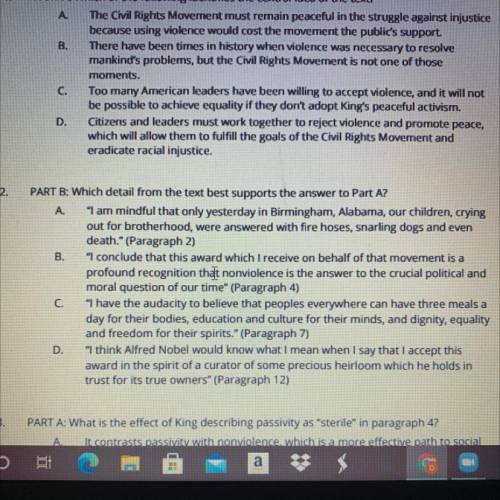Need help with part b
...

Answers: 2


Other questions on the subject: English


English, 22.06.2019 06:50, CrownedQueen
Isaw clearly the doom which had been prepared for me, and congratulated myself upon the timely accident by which ! had escaped. another step before my fall, and the world had seen me no more and the death just avoided was of that very character which i had regarded as fabulous and frivolous in the tales respecting the inquisition. to the victims of its tyranny, there was the choice of death with its direst physical agonies, or death with its most hideous moral horrors. i had been reserved for the latter. by long suffering my nerves had been unstrung, until i trembled at the sound of my own voice, and had become in every respect a fitting subject for the species of torture which awaited me. which torture does the passage above reference? a. being eaten alive by rats b. being sliced open by a giant blade c. being killed by falling into a hole d. being burned alive
Answers: 3

English, 22.06.2019 07:00, gabbypittman20
From this story and the indian saying which precedes it, what can the reader conclude about the culture in which the tale is set? a) they believe that death is always signified by pigeons flying away. b) they think that the behavior of creatures in the natural world can indicate things that will happen to people. c) they believe that honest, hard work provides relief from the ravages of the natural world. d) they think that death isn't the end, but only the beginning of a new life.
Answers: 2

English, 22.06.2019 10:00, fespinoza019
Ineed . read this textbook passage. select the five (5) statements which are most logically supported by the given information. what would you do if you won ten million dollars in a lottery? your first reaction might be, “i’d spend the rest of my life on the beach (or skiing or traveling).” but in all likelihood you, like most other people who receive financial windfalls, would seek some kind of work eventually. a variety of motives keeps people working, even when they don’t need a paycheck to survive. if you’ve ever worked as a volunteer, you know that someone can be more satisfying than receiving pay. work also provides a sense of identity. one man aged 81 said, “i’ve been in the fabric business since i was a kid, and i still get a kick out of it." studies suggest that rats, pigeons, and children sometimes work to gain rewards, even if they can get the same rewards without working. one researcher wrote the following on the subject: rats will run down an alley tripping over hundreds of food pellets to obtain a single, identical pellet in the goal box, . . and pigeons will peck a key . . to get exactly the same food that is freely available in a nearby cup. given the choice of receiving marbles merely by waiting a certain amount of time for their delivery, children tend to prefer to press a lever . . to get the same marbles. 1. serving a purpose is satisfying. 2. it is not so lucky to win a large amount of money in a lottery. 3. endless “vacationing” eventually becomes dissatisfying. 4. the pay we receive is unimportant. 5. most people try to work as little as possible. 6. people, rats, and pigeons enjoy the challenges and interaction that work offers. 7. it generally feels better to achieve something than to be given something. 8. people who don’t retire continue to work only because they need the money. 9. most people who work as volunteers resent the fact that they are not paid for their work. 10. work can be its own reward.
Answers: 1
You know the right answer?
Questions in other subjects:

English, 14.02.2021 08:50

Mathematics, 14.02.2021 08:50

English, 14.02.2021 08:50

Health, 14.02.2021 08:50

Physics, 14.02.2021 08:50

English, 14.02.2021 08:50








